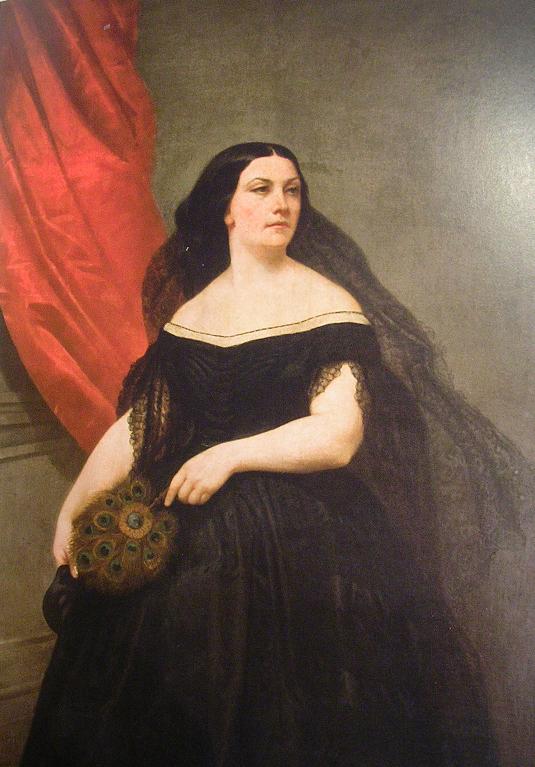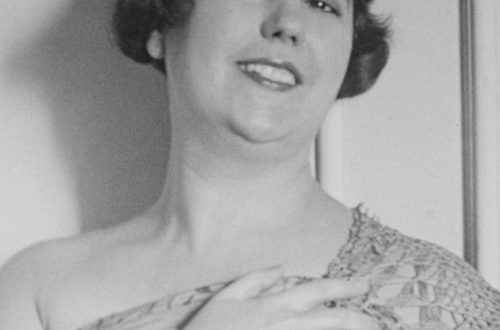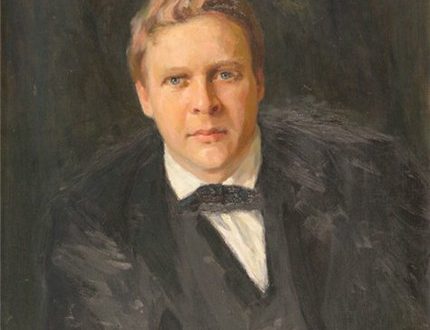
Giulia Grisi |
Giulia Grisi
F. Koni wrote: “Giulia Grisi is the greatest dramatic actress of our time; she has a strong, resonant, energetic soprano… with this power of voice she combines an amazing fullness and softness of sound, caressing and charming the ear. Mastering her flexible and obedient voice to perfection, she plays with difficulties, or, rather, does not know them. The amazing purity and evenness of vocalization, the rare fidelity of intonation and the truly artistic elegance of the decorations she uses moderately, give her singing a wonderful charm … With all these material means of performance, Grisi combines more important qualities: warmth of soul, constantly warming her singing, a deep dramatic feeling, expressed both in singing and in playing, and a high aesthetic tact, which always indicates to her natural effects and does not allow exaggeration and affectation. V. Botkin echoes him: “Grisi has the advantage over all modern singers that, with the most perfect processing of her voice, with the most artistic method, she combines the highest dramatic talent. Anyone who has ever seen her now … will always have in his soul this majestic image, this flaming look and these electric sounds that instantly shock the entire mass of spectators. She is cramped, she is uncomfortable in calm, purely lyrical roles; her sphere is where she feels free, her native element is passion. What Rachel is in tragedy, Grisi is in opera … With the most perfect processing of the voice and artistic method, of course, Grisi will sing excellently any role and any music; the proof [is] the role of Rosina in The Barber of Seville, the role of Elvira in The Puritans and many others, which she constantly sang in Paris; but, we repeat, her native element is tragic roles … “
Giulia Grisi was born on July 28, 1811. Her father, Gaetano Grisi, was a major in the Napoleonic army. Her mother, Giovanna Grisi, was a good singer, and her aunt, Giuseppina Grassini, became famous as one of the best singers of the early XNUMXth century.
Giulia’s older sister Giuditta had a thick mezzo-soprano, graduated with honors from the Milan Conservatory, after which she made her debut in Vienna, in Rossini’s Bianca e Faliero, and quickly made a brilliant career. She sang in the best theaters in Europe, but left the stage early, marrying the aristocrat Count Barney, and died in the prime of life in 1840.
Julia’s biography has developed more happily and romantically. That she was born a singer was obvious to everyone around her: Julia’s gentle and pure soprano seemed made for the stage. Her first teacher was her elder sister, then she studied with F. Celli and P. Guglielmi. G. Giacomelli was next. When Giulia was seventeen years old, Giacomelli considered that the student was ready for a theatrical debut.
The young singer made her debut as Emma (Rossini’s Zelmira). She then went to Milan, where she continued to study with her older sister. Giuditta became her patroness. Julia studied with the teacher Marlini. Only after additional preparation did she reappear on stage. Giulia now sang the part of Dorlisca in Rossini’s early opera Torvaldo e Dorlisca at the Teatro Comunale in Bologna. Criticism turned out to be favorable to her, and she went on her first tour of Italy.
In Florence, the author of her first performances, Rossini, heard her. The composer appreciated both the magnificent vocal abilities, and the rare beauty, and the amazing performance of the singer. Another opera composer, Bellini, was also subdued; The premiere of the performance took place in 1830 in Venice.
Bellini’s Norma premiered on December 26, 1831. La Scala gave an enthusiastic welcome not only to the famous Giuditta Pasta. The little-known singer Giulia Grisi also received her share of applause. She performed the role of Adalgisa with truly inspired courage and unexpected skill. Performance in “Norma” finally contributed to her approval on stage.
After that, Julia quickly climbed the ladder of fame. She travels to the capital of France. Here, her aunt Giuseppina, who once won the heart of Napoleon, headed the Italian theater. A magnificent constellation of names then adorned the Parisian scene: Catalani, Sontag, Pasta, Schröder-Devrient, Louise Viardot, Marie Malibran. But the almighty Rossini helped the young singer get an engagement at the Opera Comic. Performances followed in Semiramide, then in Anne Boleyn and Lucrezia Borgia, and Grisi conquered the demanding Parisians. Two years later, she moved to the stage of the Italian Opera and soon, at the suggestion of Pasta, she realized her cherished dream by performing the part of Norma here.
From that moment on, Grisi stood on a par with the greatest stars of her time. One of the critics wrote: “When Malibran sings, we hear the voice of an angel, directed to the sky and overflowing with a true cascade of trills. When you listen to Grisi, you perceive the voice of a woman who sings confidently and widely – the voice of a man, not a flute. What’s right is right. Julia is the very embodiment of a healthy, optimistic, full-blooded beginning. She became, to a certain extent, a harbinger of a new, realistic style of operatic singing.
In 1836, the singer became the wife of the Comte de Melay, but she did not stop her artistic activity. New triumphs await her in Bellini’s operas The Pirate, Beatrice di Tenda, Puritani, La sonnambula, Rossini’s Otello, The Woman of the Lake, Donizetti’s Anna Boleyn, Parisina d’Este, Maria di Rohan, Belisarius. The wide range of her voice allowed her to perform both soprano and mezzo-soprano parts with almost equal ease, and her exceptional memory allowed her to learn new roles with amazing speed.
Touring in London brought an unexpected change in her fate. She sang here with the famous tenor Mario. Julia had previously performed with him both on the stages of Paris and in the salons, where the entire color of the Parisian artistic intelligentsia gathered. But in the capital of England, for the first time, she really recognized Count Giovanni Matteo de Candia – that was the real name of her partner.
The count in his youth, having abandoned family titles and land, became a member of the national liberation movement. After graduating from the Paris Conservatory, the young count, under the pseudonym Mario, began performing on stage. He quickly became famous, traveled all over Europe, and gave a large part of his huge fees to Italian patriots.
Julia and Mario fell in love. The singer’s husband did not object to the divorce, and the artists in love, having received the opportunity to join their fate, remained inseparable not only in life, but also on stage. The performances of the family duet in the operas Don Giovanni, The Marriage of Figaro, The Secret Marriage, The Huguenots, and later in the Il trovatore evoked a standing ovation from the public everywhere – in England, Germany, Spain, France, Italy, and America. Gaetano Donizetti wrote for them one of his sunniest, optimistic creations, the opera Don Pasquale, which saw the light of the ramp on January 3, 1843.
From 1849 to 1853, Grisi, together with Mario, repeatedly performed in Russia. Russian audiences have heard and seen Grisi in the roles of Semiramide, Norma, Elvira, Rosina, Valentina, Lucrezia Borgia, Donna Anna, Ninetta.
The part of Semiramide is not among the best parts written by Rossini. With the exception of Colbrand’s brief performance in this role, in fact, there were no outstanding performers before Grisi. One of the reviewers wrote that in previous productions of this opera, “There was no Semiramide… or, if you like, there was some kind of pale, colorless, lifeless figure, a tinsel queen, between whose actions there was no connection, either psychological or stage.” “And finally she appeared – Semiramis, the majestic mistress of the East, posture, look, nobility of movements and poses – Yes, this is she! A terrible woman, a huge nature … “
A. Stakhovich recalls: “Fifty years have passed, but I can’t forget her first appearance …” Usually, Semiramide, accompanied by a magnificent cortege, appears slowly on the tutti of the orchestra. Grisi acted differently: “… suddenly a plump, black-haired woman, in a white tunic, with beautiful, bare arms to the shoulders, quickly comes out; she bowed low to the priest and, turning with a wonderful antique profile, stood in front of the audience amazed by her regal beauty. Applause thundered, shouts: bravo, bravo! – do not let her start the aria. Grisi continued to stand, beaming with beauty, in her majestic pose and did not interrupt her wonderful introduction to the role with bows to the audience.
Of particular interest to the St. Petersburg audience was Grisi’s performance in the opera I Puritani. Until that time, E. Frezzolini remained the unsurpassed performer of the role of Elvira in the eyes of music lovers. Grisi’s impression was overwhelming. “All comparisons were forgotten…,” wrote one of the critics, “and everyone indisputably admitted that we had not yet had a better Elvira. The charm of her game captivated everyone. Grisi gave this role new shades of grace, and the type of Elvira she created can serve as a model for sculptors, painters and poets. The French and Italians have not yet resolved the controversial issue: should singing alone prevail in the performance of the opera, or should the main stage condition remain in the foreground – the game. Grisi, in the role of Elvira, decided the question in favor of the last condition, proving by an amazing performance that the actress occupies the first place on the stage. At the end of the first act, the scene of madness was conducted by her with such high skill that, shedding tears from the most indifferent spectators, she made everyone marvel at her talent. We are accustomed to seeing that stage craziness is characterized by sharp, angular pantomimes, erratic movements and wandering eyes. Grisi-Elvira taught us that nobility and grace of movement can and should be inseparable in madness. Grisi also ran, threw herself, knelt, but all this was ennobled … In the second act, in her famous phrase: “Give me back hope or let me die!” Grisi amazed everyone with her completely different color of musical expression. We remember her predecessor: this phrase has always touched us, like a cry of desperate, hopeless love. Grisi, at the very exit, realized the impossibility of hope and the readiness to die. Higher, more elegant than this, we have not heard anything.
In the second half of the 50s, the disease began to undermine the crystal clear voice of Julia Grisi. She fought, was treated, continued to sing, although the previous success no longer accompanied her. In 1861 she left the stage, but did not stop performing in concerts.
In 1868 Julia sang for the last time. It happened at Rossini’s funeral. In the church of Santa Maria del Fiore, together with a huge choir, Grisi and Mario performed the Stabat Mater. This performance was the last for the singer. According to contemporaries, her voice sounded beautiful and soulful, as in the best years.
A few months later, both of her daughters died suddenly, followed by Giulia Grisi on November 29, 1869.





